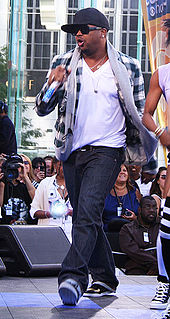A Quote by Barack Obama
It wasn't until about a year, year and a half in where I began to realize that the Pentagon and our national-security apparatus and the CIA were all getting too comfortable with the technology as a tool to fight terrorism, and not being mindful enough about how that technology is being used and the dangers of a form of warfare that is so detached from what is actually happening on the ground. And so we initiated this big process to try to get it in a box.
Related Quotes
I have no opposition at all to technology. I think technology is a wonderful thing that has to be used thoughtfully, and we can't just assume that every bit of new technology improvesthe quality of life; it's really in how the technology is used. What I am very disturbed about is this trend of everything happening faster and faster and faster and there being more and more general noise in the world, and less and less time for quiet reflection on who we are, and where we're going.
I'm not a big believer in revolutions. What people call revolutions in technology were more of a shift in perception - from big machines to PC's (the technology just evolved, fairly slowly at that), and from PC's to the internet. The next "revolution" is going to be the same thing - not about the technology itself being revolutionary, but a shift in how you look at it and how you use it.
I am extraordinarily fascinated by the future of technology. We are in the early infancy of technology, and we have an opportunity to guide how technology develops and integrates into our lives. I talk a lot about the 'invisible interface,' or the idea that we can utilize technology without being absorbed into a screen.
10 years ago [in 2006], nearly 90 percent of those albums sold enough in that year to reach Gold status. 10 years later, about 30 percent were eligible. With the new rules, we figure about 40 percent of the top 200 best-sellers for the year will be eligible. We were very cautious in our approach to changing how we calculate what is eligible because the integrity of the process is our foremost consideration. It's difficult to get certified sales awards, and it's a big deal and we didn't want there to be a huge change in how many would be eligible.
National security is a really big problem for journalists, because no journalist worth his salt wants to endanger the national security, but the law talks about anyone who endangers the security of the United States is going to go to jail. So, here you are, especially in the Pentagon. Some guy tells you something. He says that's a national security matter. Well, you're supposed to tremble and get scared and it never, almost never means the security of the national government. More likely to mean the security or the personal happiness of the guy who is telling you something.
This is the same problem I have with digital photography. The potential is always remarkable. But the medium never settles. Each year there is a better camera to buy and new software to download. The user never has time to become comfortable with the tool. Consequently too much of the work is merely about the technology. The HDR and QTVR fads are good examples. Instead of focusing on the subject, users obsess over RAW conversion, Photoshop plug-ins, and on and on. For good work to develop the technology needs to become as stable and functional as a typewriter.
People always think of technology as something having silicon in it. But a pencil is technology. Any language is technology. Technology is a tool we use to accomplish a particular task and when one talks about appropriate technology in developing countries, appropriate may mean anything from fire to solar electricity.
When you're pregnant, you can think of nothing but having your own body to yourself again; yet after giving birth you realize that the biggest part of you is now somehow external, subject to all sorts of dangers and disappearance, so you spend the rest of your life trying to figure out how to keep her close enough for comfort. That's the strange thing about being a mother: Until you have a baby, you don't even realize how much you were missing one.
If the tea party folks would go out there and get angry because they think their taxes are too high, for God's sake, a lot of citizens ought to get angry about the fact that they're being killed and our planet's being injured by what's happening on a daily basis by the way we provide our power and our fuel and the old practices that we have. That's something worth getting angry about.
One of the things that's exciting for me about this novel is that, to me, Brookland and The Testament of Yves Gundron were both, in certain regards, crypto-steampunk. They're both books that are interested in an alternate technological past that in fact didn't historically come to pass. If you were to ask me what my novels were about, I would say, well, these are novels about technology and how we relate to technology and what technology means.


































